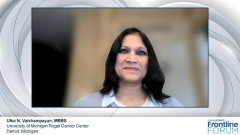
Advanced Renal Cell Carcinoma: An Evolving Treatment Armamentarium
Expert oncologists Matthew Campbell, MD, MS, and Brian Rini, MD, open their discussion on advanced renal cell carcinoma management by defining cornerstone treatment approaches.
Episodes in this series

Transcript:
Matthew T. Campbell, MD, MS: Hello and thank you for joining this Cancer Network®Frontline Forum program, “Recent Advances in the Treatment of Clear Cell and Nonclear Cell Renal Cell Carcinoma.” I am Dr Matthew Campbell. I’m an associate medical director for the Department of Genitourinary Medical Oncology, Division of Cancer Medicine, at the MD Anderson Cancer Center in Houston, Texas, and today I’m joined by my esteemed colleague, Dr Brian Rini. I would like to invite Dr Rini to introduce himself.
Brian I. Rini, MD: Thanks, Matt, I’m Brian Rini. I’m a GU [genitourinary] medical oncologist with an interest in kidney cancer. I work at Vanderbilt University Medical Center in Nashville, Tennessee.
Matthew T. Campbell, MD, MS: Thank you so much for joining me. This program is an extension of a meeting that Dr Rini and I had with a group of other expert faculty around the IKCS [International Kidney Cancer Symposium] conference just a few days ago in Austin, Texas, to discuss the current landscape of kidney cancer treatment. Dr Rini and I will discuss recent data updates and share our insights on how they can be applied in the clinical practice for patients with advanced RCC [renal cell carcinoma]. Let’s begin. Dr Rini, what are the available treatment options for patients with advanced kidney cancer?
Brian I. Rini, MD: This is a big question of course. I’ll try to summarize a lot of data quickly. I think the standard of care for advanced clear cell kidney cancer, and probably for nonclear cell kidney cancer, is an immune-based doublet that comes in 1 of 2 flavors. They all have a PD-1 inhibitor as a backbone, and then ipilimumab plus nivolumab adds a CTLA-4 inhibitor, and then there are 3 IO/TKI [immunotherapy/tyrosine kinase inhibitor] regimens, which add a small molecule VEGF inhibitor. The consistencies of these 4 immune-based doublets are in a survival advantage against sunitinib monotherapy, the standard control in all the arms. That OS [overall survival] hazard ratio is in the 0.7 range, so remarkably consistent across trials.
The differences come certainly in toxicity with the different TKIs or with ipilimumab. There are differences in response rate and progression-free survival, generally higher with the IO/TKI regimens, especially lenvatinib plus pembrolizumab, which has some of the most impressive data on these tumor shrinkage end points. The durability of response probably favors ipilimumab plus nivolumab, although we don’t yet have very mature data for the IO/TKIs. This has been a topic over the last several years of which regimen and all immune vs IO/TKI. I think for me, the take-home point is they’re all effective. I think they’re all more effective than TKI monotherapy, and it’s really a matter of developing expertise with the delivery of these regimens, and toxicity management, and when to hold. The nuances of giving drugs to patients, I think, are probably more important than us arguing over which one is the best, and hopefully we’ll build on these regimens moving forward.
Matthew T. Campbell, MD, MS: Fantastic. And we’ve been very focused in the frontline space. There are a couple of exciting agents that are coming down in terms of later-line options. How do you see targeting HIF [hypoxia inducible factor]-2alpha with belzutifan, for instance, flavoring into the treatment of advanced kidney cancer?
Brian I. Rini, MD: Belzutifan is a transcription inhibitor that inhibits HIF-alpha, which is integral to the biology of clear cell kidney cancer. There are some data in the refractory setting with about a 25% response rate. So, pretty good; it is pretty similar to the TKIs and a very well-tolerated agent. The first data we’ll get are on belzutifan vs everolimus, that’s the initial registration trial. We’ll see how that turns out.
The drug is being tested in a wide variety of settings, second line, first line, all over the place. I think it will ultimately find a home as part of combination therapy in the front line. I’d love to think that it could replace TKIs as a less toxic alternative. I’m not sure that’s the case. But hopefully we’ll see a lot of these investigations probably over the next couple of years and figure out where it belongs. But I think it belongs somewhere. I’m curious as to what your opinion is about that.
Matthew T. Campbell, MD, MS: Yes, I agree. I think it’s an agent where we have a lot of enthusiasm and excitement. Clearly it now available for our patients who have VHL [von Hippel-Lindau] syndrome in kidney cancer. And the early data with belzutifan looked very promising in the very late-line settings. So, I like you, am very interested to see the phase 3 data, and then all the data we’re getting in the earlier lines of therapy. It’s certainly good to have a new mechanism potentially on the horizon for us as a new treatment.
Transcript edited for clarity.
Newsletter
Stay up to date on recent advances in the multidisciplinary approach to cancer.












































